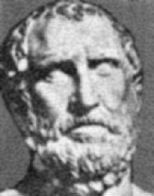

Very little is known of the life of Zeno. The main source of our knowledge of Zeno comes from Plato. Zeno was a pupil and friend of the philosopher Parmenides, the founder of the Eleatic School, one of the leading pre-Socratic schools of Greek philosophy. This philosophy of monism claimed that the many things which appear to exist are merely a single eternal reality which he called Being.
Zeno achieved a certain fame in Athens for writing his famous work which contained 40 paradoxes concerning the continuum. Three of the paradoxes, which we shall discuss in detail below, were to have a profound influence on the development of mathematics.
In the paradox named "The Dichotomy", Zeno says: "There is no motion because that which is moved must arrive at the middle of its course before it arrives at the end." That is, in order the traverse a line segment it is necessary to reach its midpoint. To do this one must reach the 1/4 point, to do this one must reach the 1/8 point, and so on. Hence motion can never begin. Today we realize this concerns the sum 1/2 + 1/4 + 1/8 + . . . = 1, but Zeno essentially asks us to sum this sum backwards.
In "The Arrow", Zeno argues: "If everything is either at rest or moving when it occupies a space equal to itself, while the object moved is in the instant, the moving arrow is unmoved." That is, at any given moment, the arrow is at rest, so how can the arrow move? Some see this as pointing out the mathematical difficulty behind the formula v=s/t with s=0 and t=0 which would not be tackled properly until limits and the differential calculus were discovered.
The most famous of Zeno's arguments is undoubtedly "The Achilles": "the slower when running will never be overtaken by the quicker; for that which is pursuing must first reach the point from which that which is fleeing started, so that the slower must necessarily always be some distance ahead."
Both Plato and Aristotle did not fully appreciate the significance of Zeno's arguments.
It is difficult to tell precisely what effect the paradoxes of Zeno had on the development of Greek mathematics. It certainly influenced the work of Cantor, Frege, Russel, and Weierstrass much later.